- Home
- Ann Patchett
The Magician’s Assistant Page 2
The Magician’s Assistant Read online
Page 2
“It doesn’t matter,” Parsifal told Sabine later, his voice thin and light. “It’s all going to be burned up anyway.”
Sabine left the closet and called her parents.
“Shel,” her mother said when Sabine told her the news. “It’s Parsifal.”
Sabine heard her father hurrying towards the bedroom. She thought she heard her mother say, “My poor girl,” but she couldn’t be sure because her mother turned her face away from the receiver.
There was a click on the line, her father picking up the phone. “Oh, Parsifal,” he said. “He wasn’t so sick yet.”
“It was an aneurism,” Sabine said. “It was something else.”
“Are you at the hospital? We’ll come right there.” Her father was crying already, something Sabine herself had not begun to do.
“I came home.” Sabine sat down on the bed and pulled the rabbit into her lap.
“Then we’ll come there,” her mother said.
Sabine told them it was late, she was tired, tomorrow there would be endless things to do. The rabbit pulled away from her, burrowed into a tunnel of sheets.
“We loved him,” Sabine’s father said. “You know that. He was a good boy.”
“Nothing will be the same without Parsifal,” her mother said.
Sabine told them good-night and hung up the phone.
Phan and Parsifal’s bedroom was at the far end of the house, big enough to be a living room. After Phan died, Parsifal and Sabine had spent all their time there. This was where they watched television and ate Chinese food from white paper cartons. Sometimes they would practice tricks in front of a sliding mirror, even though they were no longer performing by then. On the bedside table there were framed pictures—Parsifal with his arm draped possessively around Phan’s neck, the two of them smiling at Sabine on the other side of the camera; Parsifal and Sabine with Rabbit in a publicity shot for the act; Parsifal and Sabine on their wedding day, standing with Sabine’s parents. There was a picture of Phan’s family—his French father and Vietnamese mother, Phan in short pants, three tiny girls with round black eyes, one of them still in her mother’s arms. The portrait was formal, arranged. On each face there was only the slightest indication of a smile. Sabine took the picture from the table and brought it into bed with her. She lay on her back and studied their faces one at a time. The children looked only like their mother. The father, too tall and fair for the gathering, looked hopeful, as if he had just been introduced. Sabine had never talked to Phan much about his family. She didn’t know the names of these people and she didn’t think they were written down anywhere. Parsifal would have known. She had to assume that every person in the picture was dead. She wasn’t even sure about that. She curled herself around the rabbit. She put her hand on his back and held it still to feel the manic beating of his small heart.
After the funeral Sabine moved downstairs into Phan and Parsifal’s room. She slept in their bed. She pushed her head beneath their feather pillows. She slept like Parsifal used to sleep, endlessly. She stayed in bed when she wasn’t asleep. She used their shampoo and dark green soap. The room smelled like men. Their towels were as big as tablecloths. Hairbrushes, toothbrushes, shoe polish, every item took on the significance of memory. Suddenly Sabine could see just how full the house was, how much they had owned. She was now responsible for Parsifal’s two rug stores, for every sweater in the closet, for Phan’s toy mouse, the only thing he had left from his childhood in Vietnam, who watched her from the dresser with painted-on eyes. She had the IRAs, CDs, money markets, insurance premiums, quarterly tax reports, warranties. She had the love letters that were not written to her, the paperback mysteries, the address books. She was the last stop for all of the accumulations and memorabilia, all the achievements and sentimentality of two lives, and one of those lives should not have come to her in the first place. What would she do with Phan’s postcard collection? With his boxes of patterns for bridal gowns? With the five filing cabinets that were stuffed full of notes about computer projects and software programs, all written in Vietnamese? Closing her eyes, she imagined her parents’ deaths. She imagined her loneliness taking the shape of boxes and boxes of other people’s possessions, a terminal moraine that would keep all she had lost in front of her. She was nailed to this spot, to the exact hour of Parsifal’s death. And then what about when she died? Who was going to look at the picture of Phan’s family and wonder about them then? Who would possibly wonder about Sabine?
The phone rang constantly. It was mostly Sabine’s parents, checking on her. It was friends, people who had read the obituary. It was the polite managers from the rug stores who had a few questions. It was strangers asking to speak to Parsifal. For a while it was the hospital and the funeral home; the director at Forest Lawn, where Sabine had Parsifal’s ashes buried next to Phan’s. When the phone rang at ten o’clock on the fourth morning of his death and found Sabine still in bed but not asleep, it was the lawyer. He asked her to come in for lunch.
“I know there’s a lot to do,” Sabine said, pulling the comforter up over her shoulders, “but not today, Roger. Really, I promise I’ll come in.”
“Today,” he said.
“I’m not going anywhere.”
“There are some things I need to tell you, and I need to tell you in person, and I need to tell you now. If you can’t come to lunch, I’ll come to the house.”
Sabine put her hand over the receiver and yawned. Roger had been a friend of Parsifal’s, but Sabine thought he was pushy. “You can’t come to the house. I’m not cleaning it.”
“That means you’ll come to lunch.”
Sabine closed her eyes and agreed, only to get him off the phone. She did not have an especially curious nature. She did not care what the lawyer had to say. The worst thing he could tell her was that it was all a joke and Parsifal had left her nothing; and that, frankly, sounded like the best news possible.
If it had been Parsifal, she would have told him he needed to get out. After Phan died she’d had to beg him to even open the front door and pick up the newspaper. She would sit on the edge of his bed, this bed, holding his bathrobe in her lap. She would tell him how much better he would feel if he just got up and took a shower and got dressed, tell him that Phan would never have wanted things to be this way. The difference being, of course, that there was no one sitting on the edge of the bed now. Even Rabbit had gone off somewhere. Sabine got up and found the bathrobe but then dropped it on the floor, took up her old spot in the nest of the comforter, and went back to sleep.
Phan is in the swimming pool.
“You don’t swim,” Sabine says, but clearly, he does.
He is swimming with his eyes open, his mouth open. He shines like a seal in the light. He rolls into a backstroke and comes straight towards her. “I learned,” he calls. “I love it.”
Parsifal’s gray suit jacket is draped neatly over the back of a white wrought-iron chair. Outside it is warm but pleasant. When Phan reaches the edge of the pool, Sabine holds out her hands to him and he lifts himself up and into her arms, the cool water from his body soaking her blouse as he holds her. The gold has come back to his skin and he smells of some faint flower, jasmine or lily, that makes her want never to let him go. Phan is clearly much happier since his death. Even in his best days with Parsifal, she has never seen him so relaxed. In life he was shy and too eager to please, in a way that reminded her of a dog that had been beaten. In the fullness of life Sabine had been jealous of Phan, jealous that Parsifal had found someone else to love so much. Jealous because she had wanted that for herself and so understood. What was Sabine, then, but an extra woman, one who was inevitably dressed in a satin body stocking embroidered with spangles? A woman holding a rabbit and a hat. But Phan was always gentle with her. There was nothing about exclusion that he didn’t understand.
Sabine smiles and sits down with Phan beside the pool, letting her legs dangle in the water. The dolphins’ necks are strung with flowers. The water is the
blue of the little mountain bluebird she once saw outside of Tahoe. “What do you do now?”
He takes one of her hands between his. The eczema that plagued his palms for years is gone. “Most of the time I’m with you. I stay with you.” He stops for a minute. Phan was never one to talk about himself. “Now and then I go back to Vietnam.”
“Really?” Sabine is surprised. Phan would hardly speak of Vietnam.
“It’s a very beautiful country,” he says. “There are so many things I remember from when I was a boy, things I haven’t thought of for thirty years—grasses in the fields and the rice, when it first comes up in the spring. It’s difficult for me to explain. It’s a comfort, like listening to so many people speak Vietnamese. Sometimes I stand in the market and cry. You’ll know what I mean someday when you go home.”
“I am home.”
“Israel,” Phan says.
“It isn’t the same,” she says. “I was so young when we left there, I don’t even remember it.”
Phan shakes his head. “This isn’t our country,” he says.
Los Angeles is Sabine’s country, the only one she loves. “Where do you think Parsifal goes?” she asks.
Phan looks at her with enormous tenderness. The wind blows her hair, which is nearly as black and straight as Phan’s. Somewhere beyond the pool a mockingbird is singing. “Most of the time he’s with me,” Phan says. “We stay with you together. We go to Vietnam.”
Immediately Sabine sits up straight; she looks behind her, down a long allée that leads to a gazebo. “He’s here now?”
“He didn’t want to come.”
“No?” She whispers it.
“He’s just embarrassed. And he should be, really, he left you with too much.”
Sabine looks around, hoping that he’s close by, that he will see her there and come to her. She can hardly breathe for missing him. “It’s not like there was something he could do about it. He tried to make things easy for me, he married me.”
Phan pushes his wet hair back with his hands. He is anxious to get to his point. “You’re not the only one who was in the dark about this whole thing. I didn’t know, either. I want to tell you that. Parsifal kept this to himself. It was a decision he made a long time ago, and once he made up his mind he never went back. Not ever. So it was nothing against you or against me. It wasn’t that he didn’t love us enough.” Phan ran his foot lightly over the surface of the water, sending out a long series of tiny waves. Clearly he was thinking about going back in. “This is going to make things more difficult for you. He says he was going to tell you; he just thought there was going to be more time. The aneurism caught him off-guard. I guess that was my fault.”
Sabine has no idea what Phan is talking about, not any of it. “Your fault?”
“The aneurism,” Phan says, and snaps his wet fingers. “Quick.”
The memory is extremely far away and yet she knows this has something to do with her. She uses her hand to shade her eyes from the sun and squints at him. “You killed him?” she asks, sure that the answer is no.
Suddenly it is the old Phan next to her. His head bends down, doglike. He seems naked without a shirt. “Please don’t say that,” he says softly.
“Then explain it to me.” She feels something crawling in her throat.
“You had asked—”
“I had asked?”
“Not to suffer.”
It takes her a minute and then she remembers—how she would hope there would not be too much pain for Parsifal, how she would say it to herself as they drove home from doctors’ appointments. But to hope, to think something, that was nothing like asking.
Sabine’s legs swing out of the pool. She stands up. Her head is clear. “Jesus,” she says. “Jesus, I didn’t mean for you to kill him. I meant for you to comfort him. Comfort. If you didn’t understand you should have asked me.”
“The difference in time was very small.”
“Small?” Sabine said. “What’s small? What do you think is small?”
Phan looks at his feet. He presses his toes hard against the cement wall inside the pool. “Two years.” He shrugs, helpless. “A little more than two years.”
Sabine is dizzy and lifts her hands to her head. For the first time in her life she feels like her head is going to simply break free of her body, sail over the wall that is covered in heavy purple grapes. “How can you say two years is a small amount of time?”
“It is small,” Phan says. “You may not understand that now, but once you’re dead you’ll see. It means nothing.”
“I’m not dead.” Her voice is high. “I wanted that time.” She is crying now, inconsolable. Parsifal could still be sleeping in his own bed. This is all because of something she said, something she did. This is loneliness she has brought on herself.
The breeze over the pool is pleasant and dry, coming in from the ocean. It is a bright afternoon in Southern California. Phan is crying as well. Though his face is damp from the swimming, she can see it. His shoulders are shaking. “I had meant to make things easier for you,” he says. He slips off the edge of the pool and sinks into the water. It is not the water that is blue, nor is the blue a reflection of the sky. The pool itself is painted blue on the inside. Sabine watches him. She is trying to stop her own crying.
“Come up,” she says. Phan is swimming along the bottom. He is swimming in circles. His body is distorted by the depth into something long and dreamy, Phan does not come up because he does not need to come up. He only needs to keep swimming. She knows that he will stay down there all day.
“I’m sorry,” Sabine whispers. “Come back.” She twists her hands around themselves. She is so tired. It’s so long since there has been any rest in sleep. She waits and waits, but she might as well be waiting for a fish. Finally there is nothing left to do but go, and so she walks towards the gate. She is almost out of the garden before she remembers something and comes back to the water’s edge. “Phan?” she says. “What about the rest of it? What were you supposed to tell me?”
Phan is swimming, swimming. She doesn’t think he can hear her; or at least she knows that if she were the one underwater, she wouldn’t be able to hear.
When the telephone rang, Sabine screamed.
“You’re a half hour late,” Roger said. “Does this mean you’re standing me up?”
“What?”
“Sabine? Are you awake?”
She swallowed. Her heart was beating fast as Rabbit’s. “I forgot,” she whispered.
“Don’t clean the house,” he said. “I’m coming over.”
There was no way to make sense of the half sentences of information flooding her head. She felt that she was still trying to dig up from some terrible thickness. She put on Parsifal’s robe and washed her face several times with cold water. She was just finishing her teeth when the doorbell rang.
It is the responsibility of any good magician’s assistant to misdirect the attention of the audience, and Sabine had taken her responsibility to heart. She had worn lipstick to the breakfast table in the morning. She owned cuff bracelets and strappy high-heeled shoes. She had known how to put herself together. That was then, this is now, she thought as she made her way to the front door.
“I meant to come,” she said.
Roger kissed her on the cheek and looped a piece of her hair back behind her ear. “The place has a dress code,” he said. “They wouldn’t have let you in.”
“I’m having coffee.” Sabine walked to the kitchen and Roger followed. The house was swimming in light, but these days Sabine could sleep through any amount of brightness.
He stopped at the brain scan she had masking-taped to the refrigerator. “What the hell is this?”
“Parsifal,” she said, looking for filters.
Roger sat down at the breakfast table and lit a cigarette. He was one of the few people Sabine knew in Los Angeles who still smoked, and the only person she knew who would smoke in your house without asking, something she migh
t have minded at another time in her life. “What do you know about Parsifal’s family?” he asked her.
Sabine shrugged, switching the coffeemaker on. “I know they lived in Connecticut. I know they’re dead. I know he changed his name from Petrie. If you’ve come to break the news to me that he has some long-lost cousins who are looking for money, don’t worry; I promise to take it well.” The pieces of the dream were slipping away from her. Phan. Pool. She wished she could excuse herself for a minute and just sit down to think.
“I always thought of Parsifal as someone I knew fairly well,” Roger said, tapping an ash into a dark purple African violet on the table. “But there were a lot of things I didn’t know. The same things, I guess, that you didn’t know.”
I didn’t know about it either, Phan said. I wanted to tell you that. There. That much she remembered. Sabine stayed between the two worlds, waiting for her coffee. She wanted to be neither awake nor asleep.
“So,” Roger said, tenting his fingertips together like a corporate executive. “Here’s the thing.” He waited for a minute, thinking she would at least turn and look at him, but she didn’t and didn’t seem like she might, and so he went ahead. “Parsifal’s name wasn’t Petrie. It was Guy Fetters. Guy Fetters has a mother and two sisters in Nebraska. As far as I can tell the father is out of the picture—either dead or gone, I’m not sure which.”
She got down two yellow cups and poured the coffee. To the best of her knowledge, there was no milk or sugar in the house. “That isn’t possible,” she said.

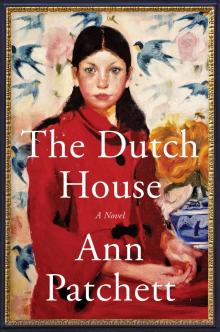 The Dutch House
The Dutch House Bel Canto
Bel Canto This Is the Story of a Happy Marriage
This Is the Story of a Happy Marriage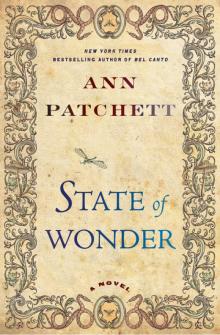 State of Wonder
State of Wonder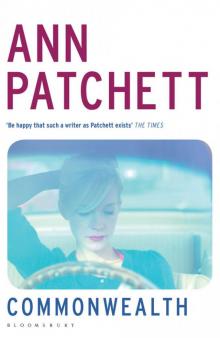 Commonwealth
Commonwealth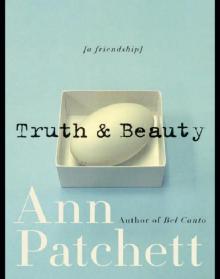 Truth & Beauty: A Friendship
Truth & Beauty: A Friendship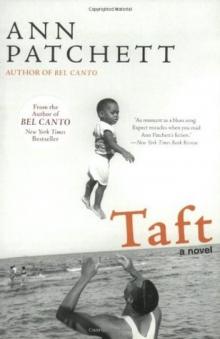 Taft
Taft What Now?
What Now?